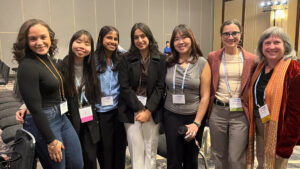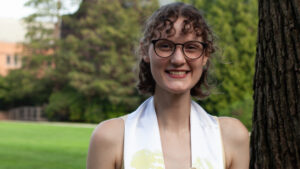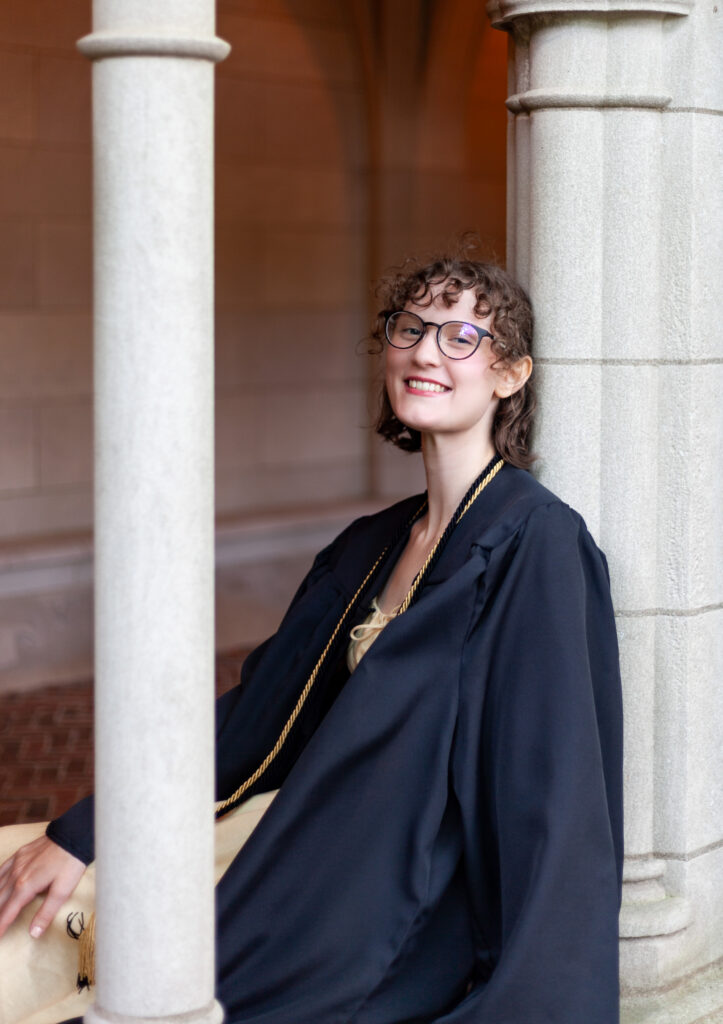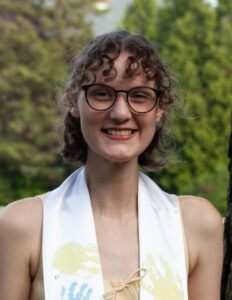
Students, Faculty, and Alumni Represent Trinity at International Neuropsychology Meeting
The 54th Annual North American Meeting of INS, “Neuropsychology in the Age of Innovation,” was held February 4-7, 2026, in Philadelphia.

Aili Ramsden ’25 was so committed to earning a Fulbright grant that she once set herself an alarm for three years into the future, marking the day when she could first apply to the Fulbright U.S. Student Program. Her dedication to her studies and research work at Trinity College have paid off, as Ramsden recently was named a finalist for a Fulbright/Maastricht University Award.
This fall, Ramsden will attend Maastricht University in the Netherlands to begin a one-year master’s program in developmental psychology. The Lakeville, Massachusetts, native graduated from Trinity in May with a bachelor of science degree, with a major in neuroscience and a minor in cognitive science.

“I first heard about Fulbright in high school, and I’ve always wanted to travel,” said Ramsden, who noted that this will mark her first trip outside of the United States. “I knew I wanted to be part of Fulbright before I knew the exact program I wanted to apply to.”
The Fulbright/Maastricht University Award is a Fulbright “partnership award” arranged with a specific university. The competitive award covers tuition, a living stipend, and travel expenses. “It’s an amazing opportunity,” Ramsden said. “It’s everything I need to be set up for the year.”
Ramsden first became interested in neuroscience after watching a documentary on Netflix. She chose Trinity as the place to pursue her studies because she was attracted to the College’s supportive community, hands-on research opportunities, and Neuroscience Program. “I loved getting to know my professors and my classmates,” she said. “You can build stronger connections at a small liberal arts college.”
While at Trinity, Ramsden was a mentor for the neuroscience mentoring group, treasurer of the Neuroscience Club, and a co-founder and co-president of the Disability Cultural Club. “I became disabled in high school,” Ramsden said. “Right before I graduated, I lost most function in my dominant arm due to a surgery. Lots of challenges came with that at college: learning how to function in a new place with a new body, with new friends and new professors. I wanted to help other people going through similar situations get the resources I wished I had early on. I helped people understand what the community could do to increase accessibility; accessibility in higher education helps both abled and disabled students.” The club will be led at Trinity by one of Ramsden’s lab mates next year.
Ramsden conducted research focusing on neuroendocrinology and addiction in the laboratory of Luis A. Martinez, associate professor of neuroscience, who also was her adviser. “He was the first professor who made me realize that research was an option for me,” Ramsden said. “I had little functioning in my arm when I started college, so we worked together to adapt different protocols, and I realized this is the field I really want to go into.” Ramsden served as a summer research fellow, wrote a senior thesis, and presented at conferences, including the Society for Neuroscience conference.
Martinez said that Ramsden’s work in his lab was outstanding, resulting in her earning a poster award at a conference and the Priscilla Kehoe Neuroscience Prize, awarded to Trinity’s top senior thesis student in neuroscience. “But just as importantly, Aili is a caring and empathetic person who is deeply committed to helping others succeed,” Martinez said. “Aili is well on her way towards having a transformative and impactful career as a developmental neuroscientist. Knowing how much this opportunity means to her, I cannot envision a more deserving student for the Fulbright award.”

Among her greatest memories at Trinity, Ramsden recalled, were New Student Orientation week, when she met some of her best friends, and taking regular evening walks with friends around campus. “My absolute favorite experience is that I worked in the Trinity College Community Child Center [TC4] for three years, in the infant room. That is one of the things that inspired me to go into developmental psychology—working with young kids, seeing how they grow up and what influences their development.”
As she completes her master’s degree at Maastricht, Ramsden also will have a volunteer internship at a local daycare center as part of the Fulbright’s host country engagement requirement. “I am really excited to get real-life experience in both normal and pathological development through immersing myself in a daycare community, working directly with kids, while also getting the academic background and research background at Maastricht,” she said.
Ramsden added about the master’s program, “It’s the perfect length, perfect place, perfect subject. I was interested in graduate programs in Europe because of the amazing longitudinal cohort studies they have. It’s the gold standard of developmental research, and I’m excited to apply that to my work in the future.”
Following her year in the Netherlands, Ramsden plans to pursue a Ph.D. in neuroimmunology. “This Fulbright will broaden my perspectives culturally and socially and allow me to become a more dynamic researcher when I come back to the U.S.,” she said. “My goal is to conduct research into how immune systems early in life, even prenatally, can impact the development of the psyche and neurodevelopment.”
Ramsden said that she ultimately wants to be a professor who teaches and also does research. “I have loved getting to know my professors at Trinity and getting to work with them so closely,” she said. “I’d love to be able to do that with my own students one day.”
Students interested in learning more about the Fulbright U.S. Student Program should contact Mark Hughes in the Trinity College Grants Office.